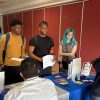
Associate Professor of Classics Heather Vincent with students
The Council of Independent Colleges Network for Vocation in Undergraduate Education (NetVUE) has awarded Eckerd College more than $30,000 to help its faculty and students answer the heady question “Why did I choose this work?”
NetVUE is a group of colleges and universities formed to foster the exploration of vocation through the lenses of theology and critical thinking. In 2017, Eckerd applied for and won a NetVUE Professional Development Award of $10,000. In Fall 2018, NetVUE awarded Eckerd an additional $22,900 in Program Development funds to help faculty continue their work.
Professor of Religious Studies Davina C. Lopez said the award was used to form a faculty committee that considered the question of their own choices as well as how to incorporate that consideration into courses on vocation.
“Often vocation is formulated in one of two ways: in a sense of calling that is linked to specific religious traditions, or it’s about a job,” Lopez explained. “We moved toward cultivating self-reflective practices that help better orient us for teaching and mentoring in a liberal arts environment.”
The original committee included Lopez, Professor of Philosophy Nate Andersen, Rhetoric Instructor Christine Auger, Professor of Literature Julie Empric, Assistant Professor of Religious Studies Amy Langenberg, Associate Professor of Rhetoric Alexis Ramsey-Tobienne and Associate Professor of Classics Heather Vincent. Each professor was given a stipend and shared texts for the group to read and discuss, including The Slow Professor: Challenging the Culture of Speed in the Academy and The Value of the Humanities. With the additional funding, other Eckerd College professors will be encouraged to form their own groups, apply to the Center for Spiritual Life for a piece of the grant funding and tackle the question of vocation for themselves. Lopez said participating professors will present their findings in a miniconference on campus in April. The funding will help faculty reframe three courses in the humanities to center on why particular subjects exist or why they need to be studied.
“One thing we concluded is that each of us is drawn to what we do for a variety of reasons that you wouldn’t predict on the surface … Teaching in a liberal arts environment is so special. What draws us to liberal arts and how we see ourselves in that context were things we learned through working together,” Lopez said.
Lopez will present the program’s broader findings at the 2019 NetVUE Conference March 21–23, 2019, in Louisville, Ky.
“Becoming professors of the liberal arts enhances the intellectual partnerships we form with our students, and they can see us as learners alongside them,” Lopez said.












